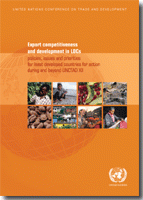
For several decades, least developed countries (LDCs) have undertaken far-reaching economic reforms, including trade liberalization and integration. Yet, these countries continue to be marginalized in the world economy.
Their persistent underdevelopment and, in many cases, long-term decline illustrate how trade and integration may be necessary but not sufficient for development and poverty reduction in LDCs. This is due to the interplay of external and internal development challenges and the problems facing the LDCs.
The present study argues that despite the many and complex obstacles, there is considerable scope for many LDCs to join the group of successful exporters, particularly in the field of traditional exports such as oil, copper, coffee, cocoa and groundnuts.
It emphasizes three important areas of non-traditional exports with significant growth potential for LDCs: horticulture, fishing and tourism.
There could also be dynamic gains particularly in traditional exports and horticulture, notably in the form of technological upgrading, quality control, marketing networks and market connections.
Key policy lessens and conclusions:
- Recent improvements in export performance of LDCs have not been accompanied by structural transformation in their economies, a fact that implies a high degree of vulnerability to shocks and crises.
- Gains from decades of liberalization policies and strategies have fallen short of expectations. Their persistent underdevelopment and, in many cases, long-term decline illustrate that trade and integration may be necessary but not sufficient for development and poverty reduction.
- There is a need for a paradigm shift in development policies and strategies in LDCs with focus on building productive capacities in these countries.
- In the short to medium term, LDCs´ growth prospects could be enhanced by improving their export competitiveness, particularly in areas where they have comparative advantage . Export growth and diversification are a decisive contributor to economic development of LDCs and the case for diversification is more persuasive today than ever before because of the continued volatility of primary product prices and the uncertainties about long-run price trends.
- Despite the increasing number of regional trading groups, particularly in Africa, the official intra-African trade flows remain very low, accounting for less than 10 per cent of total African exports and imports (excluding South Africa).
| The present study is the outcome of an UNCTAD project, implemented with the financial support of the Governments of Austria and Norway and designed to assist least developed countries in their participation in the preparatory process for and at the 12th session of the United Nations Conference on Trade and Development (UNCTAD XII). |


